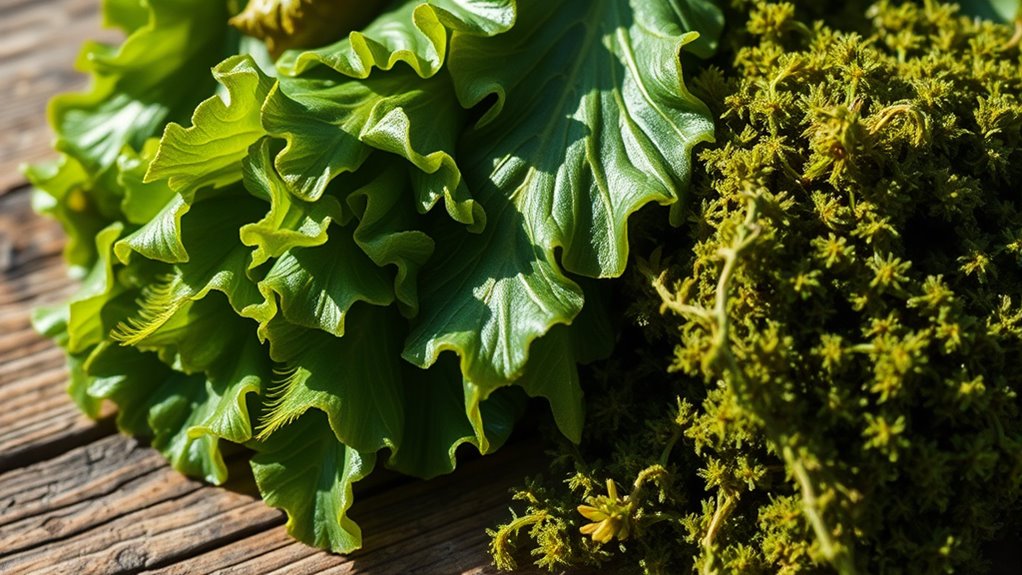Seaweed and sea moss are excellent sources of iodine, which supports your thyroid function. They also provide iron, helping boost your energy and immune health, along with fiber that promotes healthy digestion. These superfoods pack a nutrient punch and can easily be added to your diet. Incorporating them wisely guarantees you get maximum benefits while protecting marine ecosystems. Keep exploring to discover more about their nutritional benefits and how to include them in your meals.
Key Takeaways
- Seaweed and sea moss are rich sources of iodine, supporting thyroid health and hormone regulation.
- They contain significant iron levels, essential for energy production and immune function.
- High fiber content in seaweed aids digestion and promotes gut health.
- Regular consumption enhances nutrient intake of iodine, iron, and dietary fiber.
- Sustainable harvesting ensures nutrient-rich, contaminant-free seaweed and sea moss.

Seaweed and sea moss are nutrient-rich superfoods that offer a wide range of health benefits. If you’re interested in incorporating these oceanic treasures into your diet, understanding their harvesting techniques and culinary uses is essential. Harvesting techniques vary depending on the type of seaweed or sea moss, but they generally involve careful handpicking or sustainable farming practices. When harvesting, it’s crucial to avoid overharvesting to protect marine ecosystems. For wild seaweed, you might gather it with scissors or knives, ensuring only mature, healthy plants are taken. Some cultivators grow seaweed on ropes or nets, making the harvesting process more sustainable and controlled, which also guarantees you get high-quality, contaminant-free products. Once harvested, seaweed and sea moss can be prepared and enjoyed in countless culinary ways. They’re versatile ingredients that can be added to soups, salads, smoothies, and even baked goods, thanks to their mild flavor and unique texture.
Using seaweed and sea moss in cooking not only boosts flavor but also enhances nutritional value. You can rehydrate dried sea moss by soaking it in water for 10-15 minutes, which turns it into a gel-like consistency perfect for smoothies or sauces. Fresh seaweed can be lightly sautéed, used as a wrap for sushi, or chopped into salads for a salty, umami flavor. The key to maximizing their health benefits is incorporating them regularly into your meals. Their culinary uses are virtually limitless, and experimenting with different types of seaweed—such as nori, kelp, or wakame—can add variety and nutrition to your diet. When choosing seaweed or sea moss, opt for sustainably harvested options to guarantee both environmental responsibility and product safety. Proper storage, like keeping dried seaweed in a cool, dry place and refrigerating prepared sea moss gel, helps maintain freshness and nutrient integrity.
In addition to their culinary versatility, these superfoods are rich in iodine, which supports healthy thyroid function, and iron, essential for energy production and immune health. Their high fiber content aids digestion and promotes gut health, making them an excellent addition to a balanced diet. Whether you’re adding seaweed flakes to your ramen, blending sea moss into your smoothies, or using fresh seaweed as a garnish, you’re tapping into a potent source of essential nutrients. As you explore different harvesting techniques and culinary uses, you’ll discover how seamlessly these ocean plants can fit into your lifestyle, offering both flavor and health benefits in every bite.
Frequently Asked Questions
Can Seaweed and Sea Moss Help With Thyroid Health?
Yes, seaweed and sea moss can help with thyroid health by supporting hormone regulation. Their high iodine content is essential for producing thyroid hormones, which influence metabolism and energy. When you include these in your diet, you may improve your body’s ability to maintain balanced thyroid hormone levels. Just be mindful not to consume excessive amounts, as too much iodine can also disrupt thyroid function.
Are There Any Risks of Iodine Overdose From Seaweed?
Think of iodine as a powerful spice—you only need the right amount, or it can overpower your dish. Yes, there’s a risk of iodine toxicity from seaweed if you consume too much, which can harm your thyroid. To guarantee seaweed safety, stick to recommended amounts and avoid excessive intake. Monitoring your iodine levels helps prevent overdose, keeping your health balanced and your thyroid happy.
How Does Sea Moss Compare to Other Dietary Fiber Sources?
Sea moss offers a notable fiber comparison to other dietary fiber sources, providing a good amount of soluble and insoluble fiber that supports digestion and gut health. Compared to traditional sources like oats or beans, sea moss is rich in natural, bioavailable fiber that can boost your immune system and improve bowel regularity. Incorporating sea moss into your diet enhances your overall dietary benefits, offering a versatile, nutritious alternative for increasing fiber intake naturally.
Is Seaweed Suitable for People With Iron Absorption Issues?
You know what they say, “An ounce of prevention is worth a pound of cure.” Seaweed may not be ideal if you have iron absorption issues because its high mineral content can interfere with mineral interactions, potentially inhibiting iron absorption. It’s best to consult your healthcare provider before adding seaweed to your diet, especially if you’re concerned about mineral interactions or iron absorption, to make certain it’s safe for your needs.
Can Consuming Seaweed Improve Immune System Function?
Yes, consuming seaweed can boost your immune system. Its antioxidant properties help protect your cells from damage, while immune modulation supports your body’s natural defenses. Regular intake provides essential nutrients that strengthen your immune response, helping you fend off illnesses. Incorporate seaweed into your diet to harness these benefits, enjoy its unique flavor, and support overall health naturally.
Conclusion
Now that you know the rich nutrients packed into seaweed and sea moss—iodine, iron, and fiber—you hold the power to enhance your health naturally. Think of these oceanic treasures as keys to access a more vibrant you, each nutrient a essential note in your wellness symphony. By incorporating them into your diet, you’re not just nourishing your body—you’re embracing the ocean’s gift to your well-being. Immerse yourself and let these superfoods elevate your health journey.









